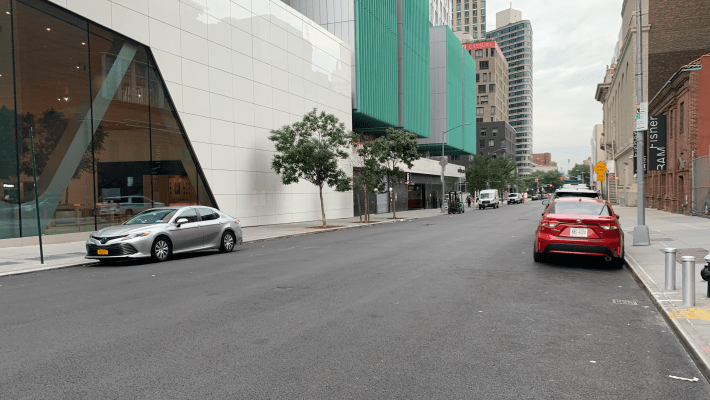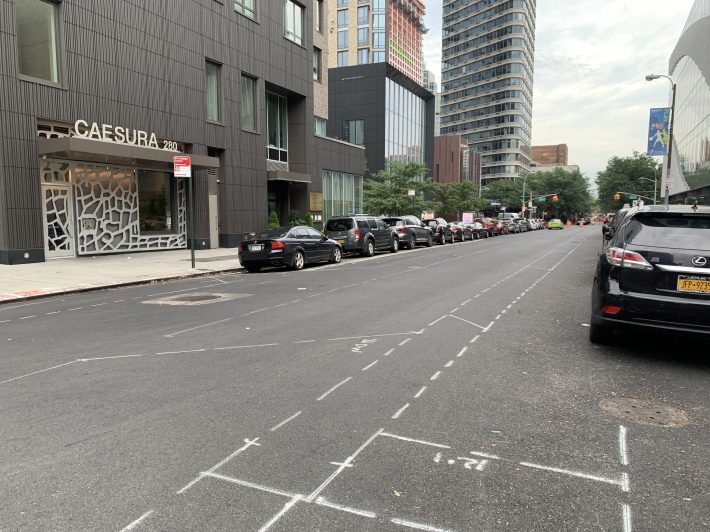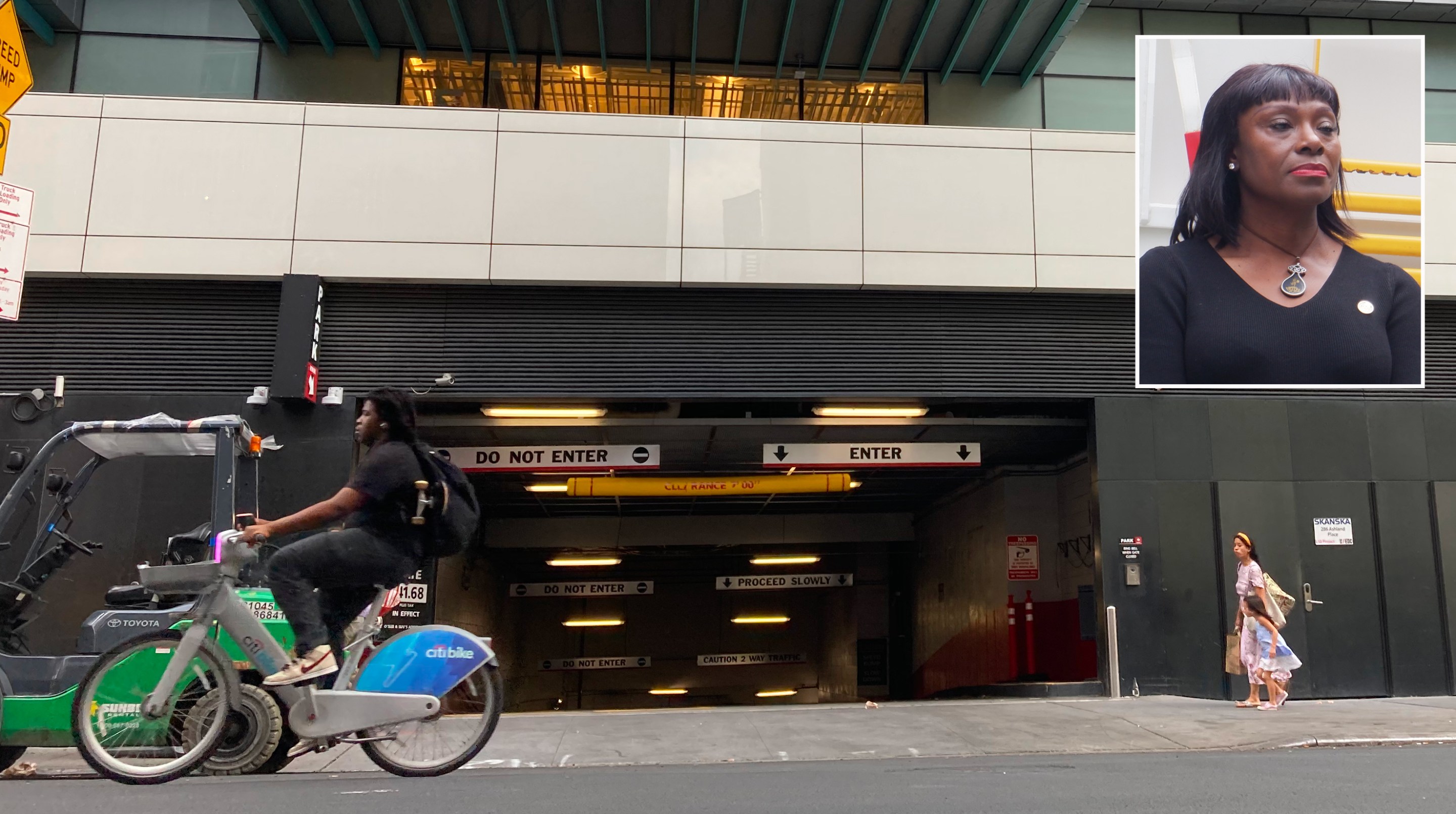Officials from the Adams administration have held up part of yet another long-planned street redesign at the behest of a major local business opposed to part of the plan, three officials told Streetsblog.
City Hall intervened in the latest Department of Transportation project — which would add protected bike lanes on Ashland Place and Navy Street in Brooklyn — after real estate giant Two Trees Management privately complained to administration higher-ups about changes slated for one block of Ashland Place, according to the three officials, who spoke on the condition of anonymity.
That block — between Hanson Place and Lafayette Avenue — features a luxury apartment tower developed by Two Trees that contains a parking garage run by a Two Trees subsidiary.
Two officials said that Ingrid Lewis-Martin — one of the mayor's top aides and a regular opponent of efforts to repurpose street space for pedestrians, cyclists and public transit riders — ordered DOT to stop work on the project, despite more than a year of prior outreach and planning.
Lewis-Martin did not respond to a request for comment. City Hall spokesman Charles Lutvak said it was “fabricated nonsense” that Lewis-Martin had ordered work stopped on the project, noting that work is being done on other blocks of Ashland Place.
But as of this morning, city workers had only painted preliminary markings for the new street layout on part of Ashland Place. The block next to the Two Trees property was conspicuously bare of any new markings.

The delay is the latest in a string of self-inflicted setbacks to the transportation agenda of the Adams administration, which has struggled to meet targets for new bike and bus lane construction despite Adams's ambitious promises while running for mayor. And, like at least one other recent episode, the Ashland Place saga followed a familiar playbook: powerful private interests opposed to improvements found a sympathetic ear in City Hall, which then overruled the administration's own transportation experts and delayed or changed a project shortly before it was to be rolled out.
Two Trees' behind-the-scenes lobbying against the bike lane plan appears to be at odds with the company's self-described commitment to "cultivating livable streetscapes," as the firm's website reads. Two Trees CEO Jed Walentas did not respond to a question about how his company's opposition to the project squares with that commitment.
In a statement, Two Trees representative David Lombino said: "We’ve been working continuously for nine months with DOT on finding a configuration that works for the various stakeholders on a complex block. Not every effort to improve a project is an indictment of the end goal."
DOT referred a request to comment to City Hall. In a statement, Lutvak, the City Hall spokesperson, said: "As part of this nearly two-mile project, DOT is continuing to work with the community like we do for every single project to ensure the safety improvements we are delivering work for the members of this community, including on this one block."
DOT unveiled its proposal for Ashland Place last summer. The half-mile street is a missing link between heavily used protected bike routes connecting Manhattan to other parts of Brooklyn, and it's near the Barclays Center transit hub and one of the most frequently used Citi Bike stations in Brooklyn. But the street is often a hectic mess of illegal parking, and what bike lanes it does have are typically blocked by cars.

In the past decade, there have been 666 reported car crashes on Ashland Place, which have killed one pedestrian and injured 53 pedestrians, 66 cyclists and 122 motorists, according to Crashmapper.
DOT's plan involved installing two-way protected bike lanes on Ashland Place and, further north, on Navy Street. The plan also called for converting the two southern-most blocks — one of which abuts the Two Trees property — from a two-way to a one-way street for cars.
The proposal faced opposition in the spring from the Brooklyn Academy of Music, which is across the street from the Two Trees building, Streetsblog reported previously. In response, DOT offered BAM a compromise: the venue could load and unload trucks in the new bike lanes, but when it did it had to create a protected detour for cyclists.
Two Trees, which owns more than 2,000 apartments and 3,000,000 square feet of commercial and industrial real estate in the city, told Streetsblog in April that it “supports the bike lane.” But within days, its public position on the project appeared to shift.
"We think this proposal may be a little shortsighted in the effect it'll have on Ashland and the activities that take place there," Fabio Cardona said at a community board meeting in April. Cardona is the property manager of 300 Ashland Pl., Two Tree's 379-unit apartment building, which hosts a Whole Foods and eventually will contain a cultural center.
The company's campaign against the project did not end there. Instead, Two Trees has been lobbying behind the scenes against the changes on its block, officials said, ultimately conveying their grievances to a sympathetic official in City Hall: Lewis-Martin.
Lewis-Martin has emerged as an opponent of street redesign projects in the Adams administration. She was the official who stymied a controversial but widely supported redesign of McGuinness Boulevard in Greenpoint — there too because a powerful local business voiced complaints. And last year, she was behind the temporary elimination of a popular open street on Willoughby Avenue in Brooklyn, which the mayor then reversed after an outcry. (She has also decried congestion pricing, and once said that she hadn't ridden the subway in more than four decades.)
But Lewis-Martin is not the only administration official who appears easily swayed by opponents of street improvement projects. Last year, Streetsblog reported that the Mayor's Office of Intergovernmental Affairs had held up plans for new bus lanes in the Bronx and Queens, and an expansion of Citi Bike in Queens, at the behest of politically connected critics. More recently, Streetsblog reported that behind-the-scenes lobbying by Rep. Adriano Espaillat has contributed to delays to a bus lane project in the Bronx that would improve the commutes of 85,000 daily riders.
Such meddling has left transportation experts in DOT frustrated and demoralized, agency staffers have said, and has impeded the administration's ability to meet goals for refashioning the city's public realm to better serve public transit users, pedestrians and cyclists.
Already by December of last year, the administration was internally projecting that it would fall short of Council-mandated construction targets for new bus lanes, Streetsblog reported.
Two Trees has frequently touted its commitment to improving New York City's public realm.
"Two Trees is definitely adamant about the expansion of the bikes in New York City," Cardona, the property manager, said at the April meeting. In an interview with the New York Times earlier this year about an ongoing Two Trees development project, Walentas, said: "Our first principle was to prioritize the public open space." And the company's website states: "Our corporate philosophy is founded upon the principle that the developers and property-owners must play a fundamental role in cultivating livable streetscapes."
Crystal Hudson, the area's Council member, did not respond to a question from Streetsblog about whether she supports the Ashland Place redesign.






